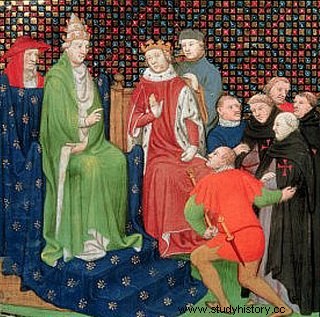
One of the great concerns of Philip the Fair, the great affair of his reign is the conflict with the Holy See, the clash with Boniface VIII. The first incident broke out in 1296. In January, Philippe, always short of money, obtained from the Assembly of the Clergy the lifting of a tenth. Protest by the clergy, who consider themselves wronged.
On February 24, the pope promulgates his famous bull Clericis laicos, which prohibits any levying of money on the clergy without authorization from the pope and affirms that the temporal power asks for contributions from the clergy only to reduce it "to its power and its domination". Even before the publication of this bull on August 18, Philippe le Bel, on the 17th of the same month, signed an ordinance prohibiting any exit of gold or silver from the kingdom.
Measure intended to facilitate the financial policy of devaluation carried out by the king, but which would considerably embarrass the papacy. Furious, Boniface VIII cried out for tyranny and promulgated the bull Ineffabilis Amor in September.
However, the conflict subsided, temporarily. The bull Romano Mater Ecclesia, in February 1297, cancels the bull Clericis laicos. On July 31, a new text, Etsi de statu, authorizes the clergy to consent to the lifting of a new tenth. Another proof of the pope's goodwill was the closure of the canonization process for Louis IX, Saint Louis. At the end of 1299, however, when Boniface proposed to Philippe to arbitrate the new Franco-English conflict, born of the alliance of the Capetian with Albert of Austria, the king replied superbly "that the government of the kingdom belongs to him and alone", and that he knows "no superior".
A much more serious conflict broke out in 1301 when, in July, Philippe arrested the bishop of Pamiers, Bernard Saisset*, a friend of Boniface VIII, whom some accused of having insulted the king. Finally accused of "heresy, treason, sedition and other misdeeds", Saisset appeared at Senlis before the king and his advisers. A memorial, prepared by Pierre Flotte*, warned the pope. The latter, by the bull Ausculta fili, in the month of December, affirms the superiority of the Holy See over all other powers, convenes a council in Rome, and criticizes the internal government of Philip.
Fury of the king and his council, the count of Artois burns the bull and the letters of the pope. Philippe forbids any relationship, any correspondence with the Holy See, and convenes for Palm Sunday the states of the kingdom, future states general. Pierre Flotte writes, in his own way, a summary of the bull which subordinates the king to the pope. The states, barons, prelates and representatives of the cities, meeting at Notre-Dame on April 10, 1302, affirm the temporal superiority of the king and forbid the bishops to go to the council. Despite the ban, many prelates go to Rome in November.
Boniface, by the bull Unam sanctam, affirms the existence of "two swords, the spiritual and the temporal", and the superiority of the first, also affirms "that it is absolutely necessary for every human creature to be subject to the Roman pontiff in order to arrive at salvation". Like the other Christians who would prevent the prelates from responding to the pope's call, Philippe le Bel is threatened with excommunication. In March 1303, the king convened a new assembly at the Louvre before which Nogaret demanded the deposition of the pope and the convocation of a general council. The conflict escalates, the pope seems more and more determined to excommunicate Philippe, and the latter to have him deposed. Nogaret obtains the support of the Colonna, enemies of the Orsini, relatives of Boniface VIII. On September 7, with their help, he attempted to kidnap the pope who had taken refuge in Anagni. The pontiff will die a month later.
His successor Benedict XI, a gentle and prudent man, absolves Philippe le Bel and his barons for the crime committed against his predecessor, but not Nogaret, whom he summons in May 1304 to appear before him. From the month of July, very opportunely, to the point that some accuse Philippe of having had him poisoned, Benedict XI gives up the ghost. The vacancy of the papal throne continues for more than a year. On November 14, 1305 only, the cardinals elect Bertrand de Goth, archbishop of Bordeaux, who becomes pope under the name of Clement V. The latter soon names nine French cardinals, to the great fury of the Italians, now in the minority. Then he fixed his residence, in 1309, in Avignon; what the Italians call the "captivity of Babylon" will last until 1378. In 1311, the pontiff breaks all the decisions taken by Boniface VIII against Philippe le Bel. The king's theories, royal absolutism, definitely prevail over Boniface's ideal of papal supremacy.
